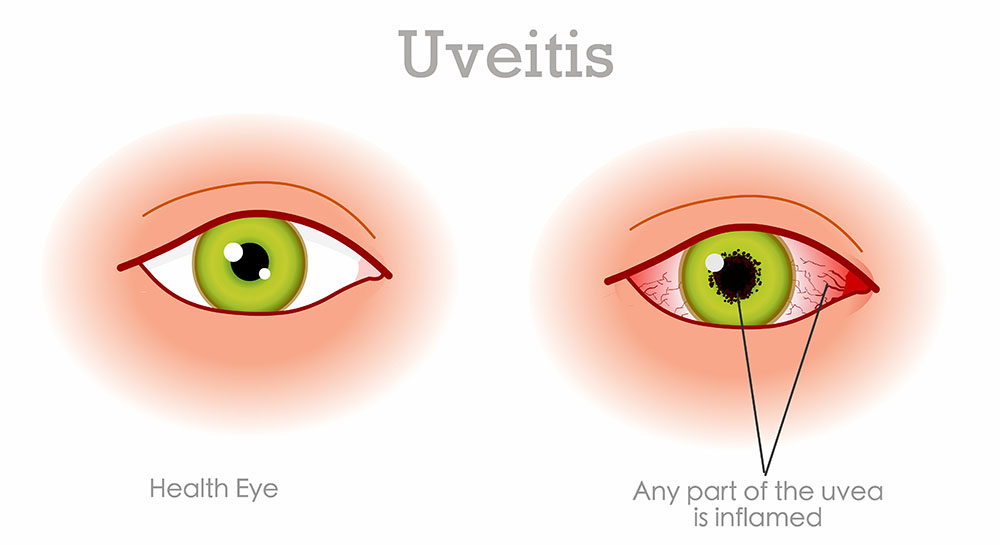What are the symptoms of uveitis?
Symptoms of uveitis can vary depending on the type and severity, but common signs include:
- Eye Redness: The white part of the eye (sclera) appears red and inflamed.
- Eye Pain: This can range from mild to severe, often described as aching or throbbing.
- Blurred Vision: Vision may become cloudy or distorted.
- Sensitivity to Light (Photophobia): Bright lights or sunlight may be uncomfortable or painful.
- Decreased Vision: Vision loss or difficulty seeing clearly.
- Floaters: Dark spots or strings that move across the field of vision.
- Headache: Associated with eye pain and discomfort.
- Tearing: Excessive tearing or watery eyes.
If you experience these symptoms, it’s important to consult an eye care professional for diagnosis and appropriate treatment.
What are the causes of uveitis?
Uveitis can have various causes, including:
- Infections: Bacterial, viral, fungal, or parasitic infections, such as herpes simplex virus, tuberculosis, or toxoplasmosis.
- Autoimmune Diseases: Conditions where the immune system attacks the body’s tissues, like rheumatoid arthritis, lupus, or Behçet’s disease.
- Trauma: Injury or physical trauma to the eye or surrounding areas.
- Systemic Inflammatory Diseases: Diseases that cause inflammation throughout the body, such as sarcoidosis or ankylosing spondylitis.
- Certain Medications: Some drugs may trigger uveitis as a side effect.
- Cancer: Rarely, eye cancer or malignancies involving the eye can lead to uveitis.
- Unknown Causes: Sometimes, the cause of uveitis cannot be determined.
Identifying the underlying cause is crucial for effective treatment and management of uveitis.
What is the treatment for uveitis?
Treatment for uveitis depends on the underlying cause, severity, and specific type of uveitis. Common treatment approaches include:
- Medications:
- Corticosteroids: To reduce inflammation and control symptoms, often administered as eye drops, oral tablets, or injections.
- Immunosuppressive Drugs: For autoimmune or inflammatory causes that do not respond to corticosteroids alone.
- Antibiotics or Antivirals: If uveitis is caused by an infection.
- Nonsteroidal Anti-Inflammatory Drugs (NSAIDs): To help manage pain and inflammation in certain cases.
- Surgical Intervention:
- Vitrectomy: In severe cases, surgery may be needed to remove inflammatory cells or debris from the vitreous humor.
- Lifestyle and Supportive Measures:
- Eye Protection: Sunglasses or other protective eyewear to reduce light sensitivity and protect the eyes from further irritation.
- Regular Monitoring: Ongoing eye exams to monitor disease progression and adjust treatment as needed.
- Treating the Underlying Cause: Addressing any systemic diseases or conditions contributing to uveitis is essential for effective management.
Early diagnosis and treatment are crucial to prevent complications and preserve vision.

Leave a Reply
You must be logged in to post a comment.